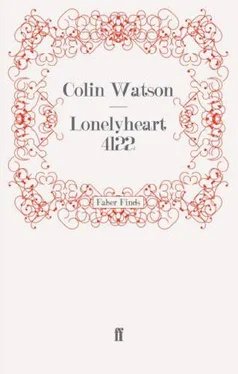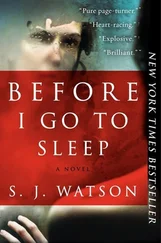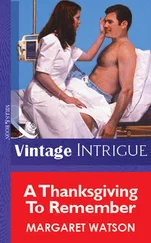Chapter Fourteen
If there was one thing about Miss Teatime that seemed predictable, it was her appearance at breakfast shortly after nine o’clock. Purbright decided that this occasion, while perhaps unorthodox, would be the best opportunity of cornering her.
He arrived at the Roebuck at ten to nine and explained his purpose to a very sleepy Mr Maddox, whose stiff morning attire was in curious contrast to the state of its occupant. He appeared to droop within his suit rather like a tortoise inside its up-ended shell.
The manager showed Purbright to a corner table and left him to his own devices after sending one of the waitresses to fetch him a pot of coffee. The inspector tried to decline the coffee, but Maddox said no, it did not do for anyone to sit in the dining room unprovided: the consequent, ah, lurking look was not quite, er...
Miss Teatime came through the door at precisely nine o’clock. Purbright felt sure of her identity even before he saw Maddox pass behind her and give a tired nod.
She looked alert and ready to be pleased. Even a glance at the menu, which she took through spectacles that she fished from her handbag and afterwards replaced, did nothing to modify her blandly sanguine expression. A character of some strength, Purbright decided.
He waited until she had finished eating and was pouring out another cup of coffee. Then he crossed to her table and introduced himself.
Miss Teatime showed sign neither of surprise nor of apprehension. She might have been in the habit of breakfasting with inspectors of police every other morning in her life.
“I am pleased to make your acquaintance, Mr Purbright,” she said, sounding as if she meant it. “Would you like me to ask the girl to bring you some coffee?” In the way she said “gairl” Purbright recognized a relic of the well-to-do female education of forty years ago.
“That’s very kind of you, but I’d rather not have any more.”
She gave a graceful little inclination of the head and began stirring her own coffee. “And what is it you wish to talk to me about, inspector?”
“In the first place, I must apologize for the intrusion.”
“Not at all.”
“Oh, but yes. You see, the intrusion has gone more deeply than you are perhaps aware. My appearance this morning is, so to speak, the tip of the iceberg. There have been inquiries—very discreet inquiries, if that is any consolation—into what normally would be rightly regarded as your private affairs. A watchful eye has even been kept on you for part of the time you have been in Flaxborough. Now then, Miss Teatime, don’t you think you are entitled to my apologies?”
Her frown was of puzzlement rather than anger.
“It all sounds very intriguing, Mr Purbright, but I am sure you did not come here to work up my indignation against these things you say you have been up to.”
He smiled. “No, but I thought I’d better prepare you for the explanation which I propose to give now.
“There has been much concern felt here over the disappearance of two local women. They were perfectly respectable and, as far as I am aware, unknown to each other. We don’t know if any harm has befallen them, but if not, it seems quite incredible that neither has got into touch with any of her relatives or friends.
“One factor is common to both these cases, Miss Teatime. The women had registered, not long before their disappearance, with a matrimonial agency here in the town called Handclasp House. I’m not going to be obtuse about this—we do know that you have approached the same organization...”
He paused, as if to invite comment.
Miss Teatime, who had been listening intently, one finger touching her cheek, said simply: “That is quite true.”
“...and naturally we hope that whatever has transpired will have a happy outcome for you. On the other hand, I think you ought to be on your guard.”
“Against disappearing?” There was a twinkle in Miss Teatime’s eye.
Purbright shrugged. “Both the women who did had recently been successful in finding companionship through this agency. The coincidence cannot be ignored. We think it was the same man in each case and that he was responsible for whatever has happened to them.”
“But you must not stretch coincidence too far, must you, inspector? Are you suggesting that this hard working gentleman has now turned his attention to me?”
“I am suggesting nothing,” said Purbright. “But I believe that a plausible and dangerous man is using the agency as a means of finding victims. If that sounds a trifle melodramatic, I’m sorry; it just happens to be the only explanation for what has been going on.”
“Then why have you not found him?”
“Because plausible and dangerous men are also as a rule very clever,” said Purbright, a shade defensively.
“Someone must have seen him in the company of these ladies, surely?”
“No one who had reason to be observant. The accounts we have been able to obtain are sketchy, to say the least.”
“You have no indication at all of his identity, then?”
Suddenly her manner relaxed.
“I’m sorry if I seem to be cross-examining you, inspector. You must see, though, that a mere general suspicion could have terribly unjust consequences. Let me be frank. I have met a gentleman through this bureau you are talking about. He impresses me as being kind and honourable. In due course, I shall doubtless learn more about his background. But the relationship is scarcely likely to prosper if I must now regard him as a police suspect.”
The inspector reflected that in Miss Teatime he, like poor Love, had got rather more than he had bargained for.
“Of course I see your point,” he assured her. “And if I may say so, you certainly don’t impress me as a gullible or incapable person. The fact remains that your—how shall I put it—your qualifications—are exactly those which we could expect to attract the attention of the man we are looking for. For instance, I believe you are not without means...”
“That is so.”
“You are also a newcomer to the district and living on your own.”
“As you can see, Mr Purbright.”
“Yes, well I don’t have to spell this out for you, do I? No policeman in similar circumstances would be doing his duty if he failed to warn you.”
She surprised him with a broad, fond smile.
“Of course not, my dear inspector. I appreciate it. But I must beg you not to worry.”
“I shall try not to,” he said drily.
“Good. Now is there anything else I can do for you? Are you sure you will not have coffee?”
“Quite sure, thank you.” He reached to an inside pocket. “But there is one way in which you can be specifically helpful. This gentleman you say you have met...oh, what’s his name, by the way?”
She hesitated, then shook her head. “I think, if you do not mind, inspector, that I should keep that to myself for the time being.”
“Are you sure you’re being wise?”
“Not unwise, I hope. Ethical, certainly.”
He shrugged. “As you wish. But at least you can tell me if you have received any letters from him.”
“Naturally. That is how these introductions are effected, you know.”
Purbright placed on the table a slip of stiff white paper on which were five or six lines of writing.
“This is a photographic copy,” he explained, “of part of a letter which we are satisfied was written by the man who made contact with the two missing women. Would you mind letting me see one of the letters you have received from your friend?”
“I should have no objection at all, Mr Purbright, but there is not one here for you to see. They were simply formal meeting arrangements. I did not keep them.”
Читать дальше












